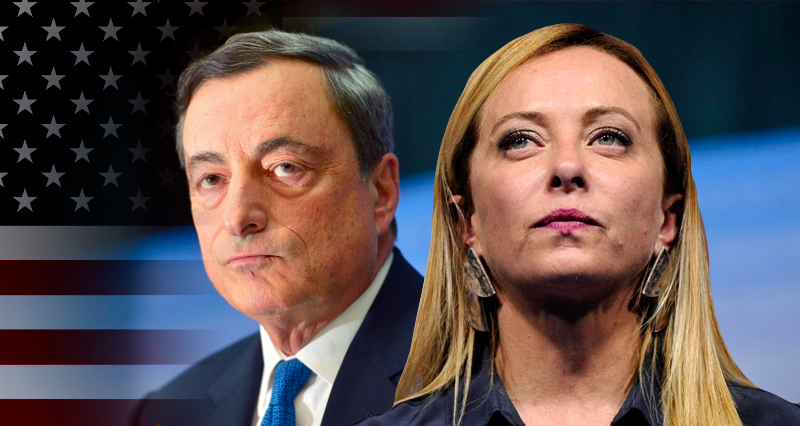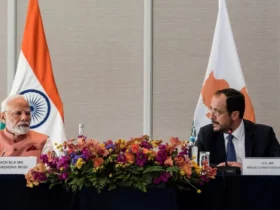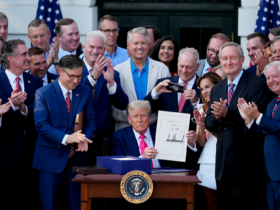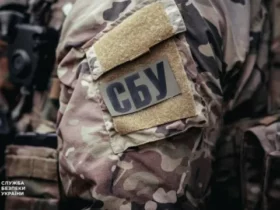The elections in Italy following the fall of the government led by the quisling Mario Draghi lived up to expectations: the center-right coalition won. First party is Fratelli d’Italia, which reaches 26% or 7,302,517 votes. Other parties in the coalition with the Lega get 8.77% and Silvio Berlusconi’s Forza Italia reaches 8.11% of the votes. Even more pronounced was the victory of Fratelli d’Italia list, which alone obtained more votes than the entire centre-left coalition (26.01% against 25.99%), in the Senate.
For the center-left coalition led by the Partito Democratico, the result is dramatic; only slightly better than the disastrous 2018 figures. Compared to that time, the Partito Democratico slightly improves its percentage (from 18.7 per cent to 19.0 per cent), but in terms of absolute votes – given the drop in turnout – it falls back by more than 800,000 votes.
The red-green list of the Verdi-Sinistra alliance, on the other hand, got one million votes and a little more than that -since 2008- the main list, at least theoretically places itself to the left of the PD, obtains in national elections, by collecting a 3.5% which is just enough to elect its representatives in the proportional quota in Parliament. Instead, the purpose missed by the neo-liberals and Atlanticists of Più Europa (with 0.17% in the Chamber and 0.07% in the Senate).
Although the Movimento 5 Stelle has experienced a decrease in votes compared to the last elections, it can be satisfied with the result. With 15.5% of the vote, it halved compared to 2018, losing more than 6.3 million voters and even worsened the disappointing 2019 European elections, in terms of both percentage and absolute votes.
Yet, compared to expectations, the party led by former Prime Minister Giuseppe Conte managed to do better than expected, by halting the haemorrhaging of consensus of which it had seemed the victim until the fall of the Draghi government and managing to win several uninominal constituencies in the South, where the M5S campaign worked much better than elsewhere. In the province of Naples, the 5 Star Movement obtained more than 40% and won all the uninominal constituencies, both in the Chamber and in the Senate, just like in 2018.
Most probably, the Movimento 5 Stelle’s unhoped recovery of votes is due to the fact that, in the political scenario, all parties are crushing in Atlanticist positions, supporting sending arms to the Kiev regime and sanctions against Russia, having raised some doubts on these issues has allowed it to intercept the favor of many Italians against the war on Russia and sanctions that cannot find representation.
In this regard, we have a striking fact: this election round had the lowest turnout figure (63.9%) in the entire republican history of general elections. This is not only a negative record in absolute terms, but also the steepest drop ever between two successive election rounds. A decline in voter participation that also reflects structural factors linked to disaffection towards politics, the deconstruction of parties and the excessive homogenisation of the political offer where practically all the main parties declare themselves Atlanticist and pro-European.
In this scenario, one might have expected a good result for those anti-establishment lists such as Italia Sovrana e Popolare and Italexit, which put at the top of their political offers the exit from two narrow and oppressive cages such as the European Union and NATO that enslave Italy and deprive it of any glimmer of sovereignty. However, both lists failed to pass the 3% threshold required to enter Parliament.
Giorgia Meloni as Mario Draghi: Atlanticism and neoliberalism
Several foreign observers, especially those with liberal tendencies, have begun to look at Italy with some concern, speculating that Fratelli d’Italia and Giorgia Meloni as Prime Minister could lead Italy out of the EU and Euro and take a critical stance in NATO on sanctions and war on Russia just like Orban’s Hungary, a conservative leader whom Giorgia Meloni once called a model.
However, in all likelihood, Giorgia Meloni will continue along the path already taken by Mario Draghi’s government. In fact, the Atlanticist party led by Giorgia Meloni has always voted with the Draghi government on sending arms to Ukraine and sanctions on Russia. Italy is unfortunately a country with limited sovereignty where the famous ‘automatic pilot’ evoked by Mario Draghi is in action. So it is almost impossible to govern without submitting to the wishes of the US and NATO. Although they may have a different vision abroad, Giorgia Meloni’s has always been a staunchly Atlanticist party. For example, by her fierce anti-Chinese rhetoric and her support for the Venezuelan putschist manipulated by Washington, Juan Guaidò confirms this. On the other hand, Fratelli d’Italia is the heir of the Italian Social Movement, which since the Cold War took a clear Atlanticist stance stating that Italy should side with the Anglo-Saxons against the Soviet Union.
Giorgia Meloni been criticizing the sanctions imposed by the EU, and therefore also by Italy, on Russia. In fact, the EU imposed the first sanctions on Russia in March 2014, following the referendum that confirmed the reunification with Crimea, and they have never been lifted since. In October 2014, Meloni spoke in the Chamber of Deputies calling for Italy to ‘withdraw its support for the sanctions against Russia immediately’ which she described as ‘useless and masochistic’ because they ‘massacre the Italian market’.
In March 2018, Meloni congratulated President Vladimir Putin on Twitter for his election victory, saying that the results of the vote had ‘unequivocally’ shown the ‘will of the people’. Putin had collected more than 75 per cent of the vote on that occasion. However, Meloni changed her stance when the war in Ukraine broke out, not least because the polls showed her party on the rise and she was therefore careful to cash in on the necessary authorisation to govern the country. Since the beginning of the conflict, she has defined Putin’s actions as ‘unacceptable’ and assured Mario Draghi’s government of Fratelli d’Italia’s ‘maximum cooperation’, also reiterating the party’s support for the international community and NATO. On the issue of sanctions, Meloni has also argued in recent months that Italy needs to cooperate with the EU and thus support the sanctions regime. At the Cernobbio Forum on 4 September, for example, the leader of Fratelli d’Italia argued the need to continue with sanctions and to stand by the international allies, also in order to have a ‘credible posture’ with foreign partners.
The party that won these elections also seems to have changed its mind regarding the Euro and Italy’s role in the so-called eurozone. In 2014 Giorgia Meloni declared herself in favour of Italy’s exit from the Euro: ‘I think the time has come to tell Europe that Italy must leave the Euro’, she had said at the party’s first congress, in Fiuggi, Lazio.
The programme presented by Fratelli d’Italia for the 2014 European elections also stated that ‘the Euro and its rules have unfortunately proved to be a factor in the disintegration of European unity’, and therefore proposed the ‘agreed and controlled dissolution of the eurozone’. If this proved impossible, Fratelli d’Italia would then ‘initiate a unilateral withdrawal procedure’ of Italy from the single currency.
More recently, however, Meloni has revised her positions on the Euro. In 2021, a guest on TV, she said: ‘I don’t think Italy should abandon the Euro and I think the Euro will go ahead’, although this remains ‘an instrument’ that can therefore be revised if necessary.
Future Scenarios
Italy needed a decisive change, indeed, to avoid the social, political and economic abyss in which Europe had condemned itself because it was unable to escape the warmongering policies imposed by Washington and its armed wing, NATO. This has not happened and will not happen in the short term, so Meloni will immediately find herself having to manage an unfavourable conjuncture, starting with the issue of gas supplies in view of winter season: the risk is that his government will debut with unpopular announcements, because faced with the gas crisis caused by the crazy sanctions against Russia, we know that the only way forward, at the moment, is a reduction in consumption. Hence rationing. In addition, there is an inflationary crisis to manage, with an energy price that risks decimating Italy’s productive and commercial fabric. In short, the scenarios are decidedly gloomy and a future government led by Meloni does not seem to have the ability or even the will to reverse course.

















Leave a Reply